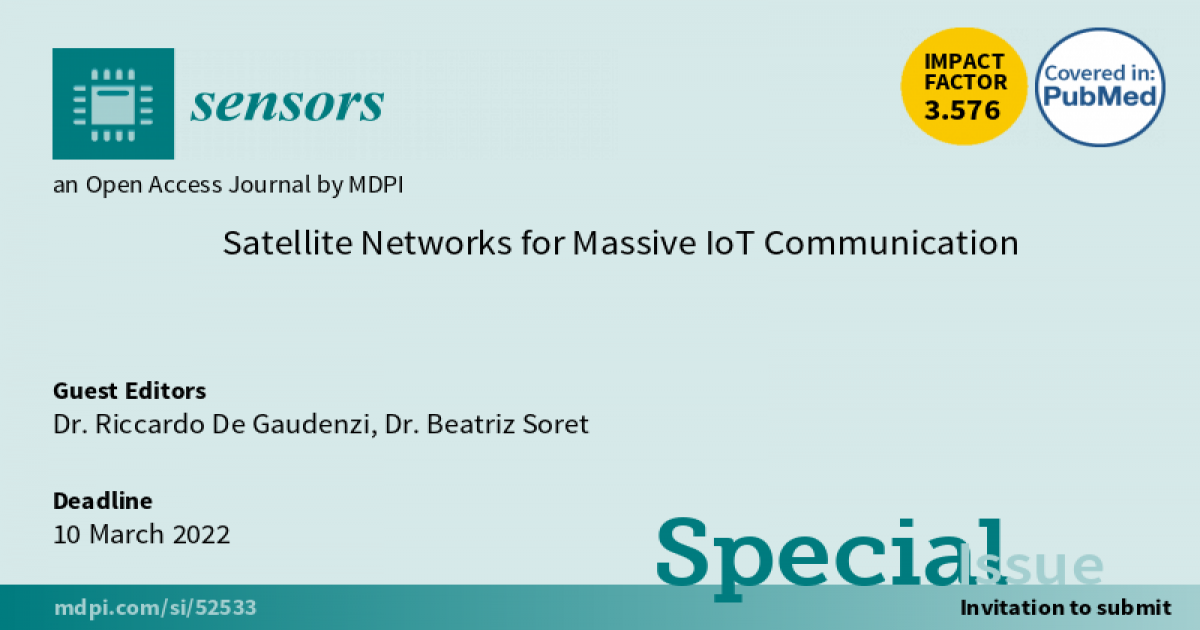- 3.5Impact Factor
- 8.2CiteScore
- 20 daysTime to First Decision
Satellite Networks for Massive IoT Communication
This special issue belongs to the section “Communications“.
Special Issue Information
Dear Colleagues,
The growing need to interconnect sensors and devices anytime, anywhere is stimulating the design and development of innovative solutions for efficiently supporting massive access applications. In particular, there is a growing interest for techniques and technologies capabable to support a host of applications: from simple low-duty cycle sensors for which energy efficiency and low-cost are of paramount importance, to more demanding platforms (e.g. automotive) hosting several sensors requiring telemetry support with global coverage. Terrestrial networks are increasingly expanding their capability to support Internet of Things (IoT) kind of services through 4G/5G cellular networks operating in licensed bands and Low Power Wide Area Networks (LPWAN) operating in unlicensed bands. These deployments will be complemented with satellite networks, to cover areas where terrestrial service cannot be provided and ensure full ubiquity. This requires, however, dedicated research and solutions for the limits imposed by satellites when providing access to a massive number of devices. In recent years we witnessed a blossoming in research about random access techniques for satellite communications. Interestingly, some of the new ideas developed found practical applications in satellite networks and have been triggering attention in the terrestrial wireless community for massive access. This special issue of Sensors is aiming at collecting state-of-the-art research paper related to random access techniques and technologies for satellite communications.
Dr. Riccardo De Gaudenzi
Dr. Beatriz Soret
Guest Editors
Manuscript Submission Information
Manuscripts should be submitted online at www.mdpi.com by registering and logging in to this website. Once you are registered, click here to go to the submission form. Manuscripts can be submitted until the deadline. All submissions that pass pre-check are peer-reviewed. Accepted papers will be published continuously in the journal (as soon as accepted) and will be listed together on the special issue website. Research articles, review articles as well as short communications are invited. For planned papers, a title and short abstract (about 250 words) can be sent to the Editorial Office for assessment.
Submitted manuscripts should not have been published previously, nor be under consideration for publication elsewhere (except conference proceedings papers). All manuscripts are thoroughly refereed through a single-blind peer-review process. A guide for authors and other relevant information for submission of manuscripts is available on the Instructions for Authors page. Sensors is an international peer-reviewed open access semimonthly journal published by MDPI.
Please visit the Instructions for Authors page before submitting a manuscript. The Article Processing Charge (APC) for publication in this open access journal is 2600 CHF (Swiss Francs). Submitted papers should be well formatted and use good English. Authors may use MDPI's English editing service prior to publication or during author revisions.
Keywords
- Capacity analysis and fundamental performance tradeoffs
- Efficient random access techniques for satellite networks
- Network architecture and protocol design for massive access via satellite solutions
- Technologies for satellite Internet of Things networks
- Low-power satellite telemetry devices
- Satellite constellations for IoT applications
- Privacy and security guarantees for massive IoT from space
- Random access in 3GPP Non-Terrrestrial Networks and beyond
- Results from real-world deployments, experiments, prototypes and testbeds

Benefits of Publishing in a Special Issue
- Ease of navigation: Grouping papers by topic helps scholars navigate broad scope journals more efficiently.
- Greater discoverability: Special Issues support the reach and impact of scientific research. Articles in Special Issues are more discoverable and cited more frequently.
- Expansion of research network: Special Issues facilitate connections among authors, fostering scientific collaborations.
- External promotion: Articles in Special Issues are often promoted through the journal's social media, increasing their visibility.
- e-Book format: Special Issues with more than 10 articles can be published as dedicated e-books, ensuring wide and rapid dissemination.

